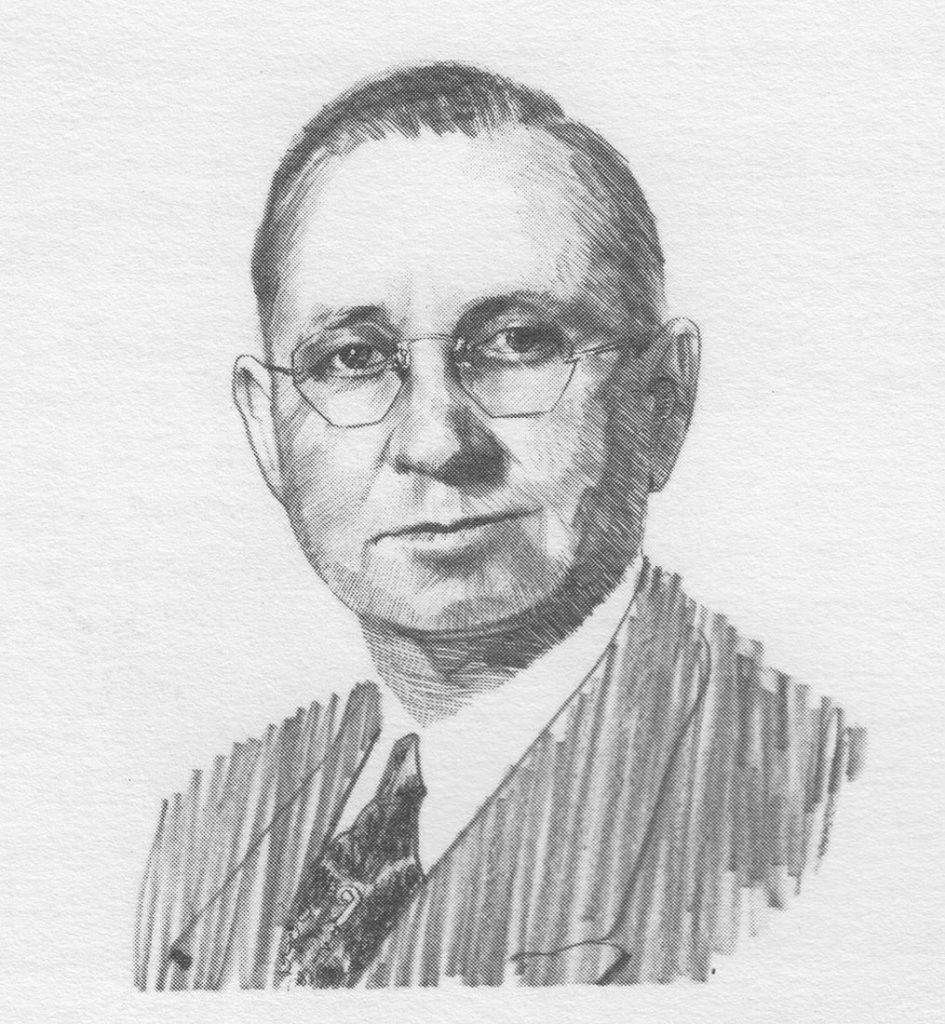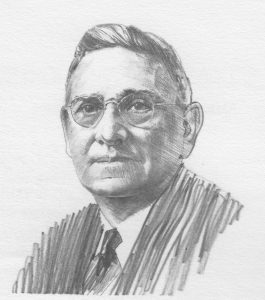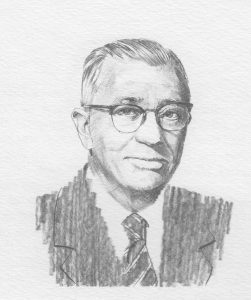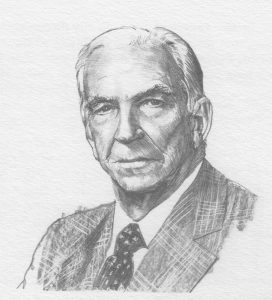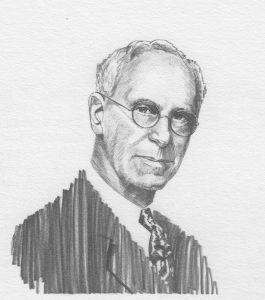At the beginning of the twentieth century, a standard ingredient for business or political success in Alabama was to be the descendent of a weathered confederate veteran from Central or South Alabama.
Lonnie Noojin found another way in attaining his successful position in the state. In the first place, he was born (in August 1885) in the hills of Marshall County in North Alabama, but to confuse matters even more, his grandfather, who had been sent to Alabama when he was left fatherless, returned to his native state Kentucky to don the blue, rather than the gray uniform. These circumstances apparently did not bother the exceptionally versatile Noojin; thus, he started life with no special advantages other than a sound mind and a sound body.
Noojin was educated in the public elementary and high schools about Attalla and Sand Mountain and graduated from high school in 1902. He worked for a year, to acquire enough funds to attend college, and in 1903 he entered North Alabama Conference College (Birmingham Southern). He remained there for one year and then left school to accumulate funds for further studies. He then entered The University of Alabama and received the Bachelor of Science degree from the Capstone in 1908. He was particularly active while at the University, serving as both the associate editor of the student newspaper and the school annual and also as president of the University Glee Club. When Phi Beta Kappa was reactivated in 1913 at the University for the first time since Civil War Days, he was one of the few former students chosen for induction.
Noojin was a superb athlete and was an outstanding member of the University baseball team Following graduation, he played professional baseball in a number of minor leagues in the South, ultimately playing in the major leagues for the Cincinnati Reds. After his playing days, he served as manager of the Asheville team in the Carolina League.
Noojin moved from professional baseball into education, and for some years taught at the Agricultural School in Blountsville, and for one year at the Agricultural School in Albertville. His tenure in Albertville was a fortunate period in his life, for there he met Willie Lucille McNaron, a granddaughter of the town’s founder, Major L. S. Emmet, a member of the historical Robert Emmet family of Dublin, Ireland. He married her in December of 1916.
From Albertville, he was invited to Howard College in Birmingham (Samford University) as Director of Athletics, coach of football and baseball, and Principal of Howard Academy High School. After some years at Howard, he was summoned to the Capstone in 1915 as Director of Athletics and Instructor in Romance Languages. To look at his record, we surmise that giants walked the earth in those days, for it is recorded that not only was he Director of Athletics, but also Instructor of English, French, and Spanish as well as Physics and Chemistry. Considering the number of subjects Noojin was expected to teach and the additional duties assigned to him, it is not surprising that in 1919 he resigned from the university to join his brother, R. 0. Noojin, in the hardware business in Gadsden.
The Noojin brothers operated a hardware store until 1923, when they founded the Noojin Supply Company, selling both hardware and building materials. Three years later, Lonnie bought his brother’s interest in the firm and became the sole owner. Throughout the years, Noojin worked hard to make his business successful and became active in a long list of civic and philanthropic activities.
During the next four decades, he became a member of the Board of Directors of the American National Bank of Gadsden, a member of and Secretary to the Board of Directors of the Alabama Power Company, and a member of the Board of Directors of the Gadsden Chamber of Commerce. He served as Lieutenant Governor of the Alabama Kiwanis Club, member of the Gadsden Rotary Club, member of the Board of Directors of the Associated Industries of Alabama, and Chairman of the Highways User’s Conference. He also served as President of the Gadsden Music Association, the Alabama Building Material Association, and the Southern Retail Hardware Association. He was Chairman of The University of Alabama Alumni Association from 1939 to 1940 and founded the Alumni Loyalty Fund of that association. Additionally, he was President of the Board of Trustees of the Wesley Foundation for The University of Alabama, President of the Board of Trustees of the National Home and Property Owners Foundation, a member and Chairman of the Board of Stewards of the First Methodist Church of Gadsden, and a member of the Newcomen Society, the Defense Saving Bond Committee for the State of Alabama, and the Board of Trustees of The University of Alabama.
As a member of the Board of Trustees of the University, he was appointed by Governor Jim Folsom to be a member of the Steering Committee to recommend a location for the University of Alabama Medical School, which at the time was to be moved from Tuscaloosa to Birmingham. Noojin was chosen as a member of a committee whose job was to build new facilities and to acquire the existing Hillman and Jefferson hospitals. His interest in medical school was so great that he contemplated turning his business over to his son and moving temporarily to Birmingham so that he could actively oversee and protect the interest of the State and the University. Unfortunately, Noojin died before the work was completed.
In any discussion of the life of Lonnie Noojin, his political affiliations play a large part, for he was an outstanding figure in the Alabama State Republican Party. He was a member of the Republican State Committee and was for his last twelve years the Republican National Committeeman for the State of Alabama.
Noojin had a capacity for understanding problems and solving them that was long recognized in the state. As difficult as it was to be a Republican leader during the days of Franklin Roosevelt, and particularly in a one-party South, Noojin led his party with energy and diligence.
As a Republican National Committeeman, Noojin was identified with the Wilkies and the Tafts. Both he and his wife knew the Deweys quite well and the families occupied adjoining hotel suites when Dewey was nominated for President. It was rumored that Senator Taft said that if he were elected President the cabinet member he would pick from the South would be Lonnie Noojin. Even though Noojin took a stand with the minority party in Alabama, he had numerous friends among the Democrats who thought highly of him. Members of both parties knew him to be a man of his word. Democratic Lieutenant Governor of Alabama, J.C. Inzer, for example, said that:
Lonnie Noojin believed in and worked for good government. He was an able and forceful leader in all matters seeking to make our cities, state, and nation a better place in which to live. He was honest, faithful, courageous, and charitable, beloved by his family, his church, his friends, and his country. Mr. Noojin’s life was a shining example of the kind of life each of us should strive to live.
On September 7, 1950, Noojin passed away in Gadsden, Alabama, a highly successful businessman who lived gracefully and endeared himself to all who had the opportunity to know him. Perhaps his most appropriate epitaph was his own comment to a Catholic sister nurse at the Holy Name of Jesus Hospital in Gadsden: “All I have ever done which was worthwhile in my life is what I have tried to do for humanity and concerning things of the spirit.”

